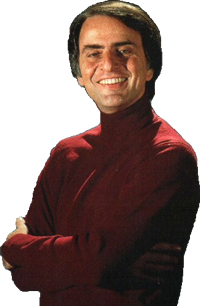

as inspired by Carl Sagan.....
Thales (624 – 546 BCE): First natural philosopher we know of. His attempt to explain phenomena without reference to the supernatural was the beginning of the scientific quest.
Anaximander (610 – 546 BCE): Theoretical scientist and first experimenter.
Theodorus (6th-century BCE): Artist, inventor, and engineer.
Pythagoras (570 – 495 BCE): Mathematical mystic. Brilliant insights combined with an exceptionally fragile grasp of reality having cult leader tendencies.
Anaxagoras (510 – 428 BCE): Skeptical inquirer charged with impiety and exiled.
Socrates (470 – 399 BCE): Examiner of life extraordinaire, but focused on the human condition and not the natural order. Asker of annoying questions, corrupter of the young (their thoughts) and threatened with exile but chose death instead.
Democritus (460 – 370 BCE): Ionian Einstein. Although Thales has been called "Father of Science", he was more of a germ cell donor. Democritus actually gave birth to science (so he could be thought of as "Father and Mother of Science"—yes, he was that talented).
Aristotle (384 – 322 BCE): Cogent systemizer, but defender of establishment ways (e.g. slavery). After his teacher Plato's death, he rejected Platonism and shifted to empirical studies. Suspected of impiety, he went into voluntary exile to avoid Socrates's treatment. Unlike Plato's, some of his work was later burned.
Pyrrho (360 – 270 BCE): First skeptic; rejected all absolute truth claims. We can know only how things appear to us. Doubt precedes inquiry and must remain ever present.
Aristarchus (310 – 230 BCE): Heliocentric astronomer and mathematician. Copernicus knew of him but failed to give credit where credit was due.
Carneades (214 – 129 BCE): Refuter of all previous dogmatic doctrines. With Carneades what would later be thought of as the "modern" scientific mind had formed. He went to Rome, spoke, they didn't like what he said, but to their credit they didn't kill him but merely forced him to return post haste to Athens. He was one of the last "candles in the dark" to shine brightly before all (e.g. Hypatia, martyred 415) were snuffed out by Roman hegemony and later rise of Christendom. The Greek free thinkers were marginalized and almost all their writings were later burned to make way for the Dark Ages.
Plato (424 – 347 BCE): Philosophical dualist and idealist hostile to evidence based claims, observation, and experimentation. His otherworldly ideas served Christian apologists (via the Neoplatonists) and so all of his work survived burning. Some of his student Aristotle's work was spared burning too, and we know of his teacher, Socrates, only because Plato's works were not burned. Our collective view of Greek thought was immeasurably skewed by the selective burning, thus 'Aristarchus' and 'Carneades' are not household names.
Saul of Tarsus (5 – 67 CE): Founder of Christianity; destroyer of the free, the curious, and the critical (aka "The Greek Miracle").
Plotinus (204 – 270 CE): Neoplatonist whose philosophical assertions about a transcendent "One" was used to make Christian, Islamic, and Judaic assertions seem intellectually respectable. The apologetic traditions, one for every system of conclusions, remain virulent.